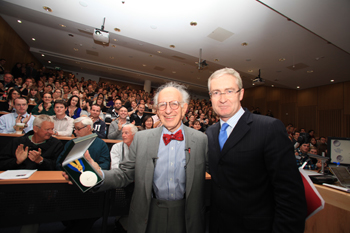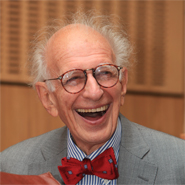Posted 21 September 2009
UCD Ulysses Medal for groundbreaking memory scientist
In recognition of his outstanding contribution to the understanding of memory, Nobel prize-winning scientist Professor Eric R Kandel has been awarded the UCD Ulysses Medal.
“Professor Kandel’s story is one of a lifetime dedicated to investigating the mechanism of memory formation; a lifetime of research achievements in his quest, as he once said himself, to understand the brain - one cell at a time,” said Dr Hugh Brady, the President of UCD, who presented the award. “This award is in recognition of his outstanding contribution to neurobiology, an inspirational story to set our resolve as scientists and researchers.”
Professor Kandel accepted the award in front of an audience of more than 250 people at UCD before delivering the plenary lecture at the UCD Conway Institute Festival of Research and Innovation on Friday 18 September 2009.

Professor Eric R Kandel with Dr Hugh Brady, President of UCD
His lecture entitled: The long and short of long-term memory, outlined his scientific work and discoveries which culminated in the 2000 Nobel Prize in Physiology or Medicine (jointly awarded to Arvid Carlsson and Paul Greengard).
The (three) Nobel Laureates, made pioneering discoveries concerning one type of signal transduction between nerve cells in the brain, known as slow synaptic transmission. The discoveries have been crucial to the understanding of the normal function of the brain and how disturbances in this signal transduction can give rise to neurological and psychiatric diseases.
Born in Vienna in 1929, Kandel immigrated to America before the start of World War II. He attributes his interest in the mind, in how people behave, the unpredictability of motivation, and the persistence of memory, to his experiences during his last year in Nazi-occupied Vienna. He also remains passionately grateful for the freedoms offered by the United States and its academic institutions which, he says, made the Nobel Prize possible for him. He is currently Director of the Kavli Institute for Brain Science and Principal Investigator at the Howard Hughes Medical Institute at Columbia University, New York.
“Few things are more exciting and stimulating to the imagination than making a new finding, no matter how modest,” states Professor Kandel in his autobiography: In Search of Memory (Norton & Company, NY, 2006). “A new finding allows one to see for the first time a part of nature – a small piece of the puzzle of how something functions.”
“I think it is important to be bold, to tackle difficult problems, especially those that appear initially to be messy and unstructured. I think it is important to define a problem or a set of interrelated problems that has a long trajectory.”
“In the study of memory storage, we are now at the foothills of a great mountain range. We have some understanding of the cellular and molecular mechanisms of memory storage, but we need to move from these mechanisms to the systems properties of memory: What neural circuits are important for various types of memory? How are internal representations of a face, a scene, a melody, or an experience encoded in the brain?”
“We need to shift from studying elementary processes – single proteins, single genes, and single cells – to studying systems properties – mechanisms made up of many proteins, complex systems of nerve cells, the functioning of whole organisms, and the interaction of groups of organisms. Cellular and molecular approaches cannot by themselves unravel the secrets of internal representations in neural circuits or the interactions of circuits – the key steps linking cellular and molecular neuroscience to cognitive neuroscience.”
The UCD Ulysses Medal is the highest honour that University College Dublin can bestow. It was inaugurated in 2005, as part of the university’s sesquicentennial celebrations, to highlight the ‘creative brilliance’ of UCD alumnus James Joyce. It is awarded to individuals whose work has made an outstanding global contribution.
Previous recipients of the UCD Ulysses Medal include: Irish playwright, Brian Friel; Irish poet, Thomas Kinsella; Nobel economist, Professor James J Heckman; Nobel laureate, Dr Phillip Sharp; founder and executive chairman of the World Economic Forum, Professor Klaus Schwab; Nobel laureate, Professor Richard Ernst; and US Philosopher, Professor Hilary Putnam.
UCD Conway Institute
The UCD Conway Institute of Biomolecular & Biomedical Research is a multidisciplinary research institute at University College Dublin (UCD). Funded by the Higher Education Authority under the Programme for Research in Third Level Institutions, the Institute opened its doors in 2003.
The research programme at the Institute focuses on biological molecules - examining how individual molecules contribute to the normal operation of cells and organs and how this can be disrupted by disease. The knowledge gained improves our understanding of the causes and effects of disease. This leads to simpler, more reliable diagnostic tests and treatments.
A Board of Management under the chairmanship of Professor Des Fitzgerald, UCD Vice-President for Research, operates UCD Conway Institute. The facility accommodates a total of 600 researchers including postgraduate students and postdoctoral fellows. The innovative building design contributes to promoting interaction between research groups by virtue of its large, open-plan research wings and central spines of shared facilities.

